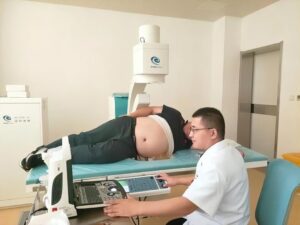Will Colorectal Cancer Be Hereditary?

As the incidence of colorectal cancer increases year by year the question “Will colorectal cancer be hereditary?” is becoming a growing concern for patients and their families. So, what is the answer?
In fact, most colorectal cancers are not hereditary! However, why do some patients’ family members also suffer from the same disease in clinical settings? Before answering this question, let’s first discuss family history. Family history refers to having a first-egree relative with a history of colorectal cancer or adenomas. Typically, the first person in a family to be diagnosed with bowel cancer is referred to as the proband, and their parents, children, and siblings are considered first-degree relatives. In other words, on the family tree, the people immediately surrounding the proband are their first-degree relatives, and the next circle outward are the second-degree relatives.
Research has shown that about 20% of colorectal cancer patients have a family history. Among these, approximately 15% are cases of familial aggregation colorectal cancer, which is usually caused by similar living environments and poor dietary habits, and is not hereditary. The remaining 5% are cases of hereditary colorectal cancer, which are truly genetic diseases caused by germline gene mutations and can be passed on to the next generation.
Next, let’s discuss this topic in two main parts.
What is Hereditary Colorectal Cancer?
If one parent has hereditary colorectal cancer, the likelihood of passing it on to their children is about 50%. Moreover, this type of disease often affects not just the intestinal organs but may also involve other organs in the body, such as the stomach, endometrium, pancreas, and biliary tract, which may also show signs of cancer. Genetic testing is needed to confirm the diagnosis. The common types include:
1.Lynch Syndrome (Hereditary Nonpolyposis Colorectal Cancer – HNPCC):
Lynch Syndrome is the most common form of hereditary colorectal cancer. The currently confirmed related pathogenic genes are MLH1, MSH2, MSH6, or PMS2 from the MMR family, so genetic diagnosis is required to confirm the condition.
This disease has an early onset, with a median age of around 44 years. In addition to colorectal cancer, it also increases the risk of other cancers such as stomach cancer, endometrial cancer, ovarian cancer, pancreatic cancer, and ureteral cancer.
Therefore, once diagnosed with Lynch Syndrome or if there is a family history of it, the earlier and more frequently you undergo colonoscopy screening, the better.
2.Familial Adenomatous Polyposis (FAP):
Familial Adenomatous Polyposis (FAP) is mainly caused by mutations in the APC gene, with dozens or even hundreds of adenomatous polyps in the colon. The key screening point is the presence of more than 10 adenomatous polyps.
FAP patients often develop adenomas in their teens. If left untreated, 100% of patients will develop colorectal cancer by the age of 50. Moreover, these patients have a high risk of other cancers, such as gastric and duodenal polyps, desmoid tumors, thyroid tumors, brain tumors, bone tumors, pancreatic cancer, and liver cancer.
The best treatment for this disease is surgical intervention, which can effectively reduce the risk of cancer. FAP is also caused by gene mutations, so regular colonoscopy examinations are necessary.
Other hereditary conditions such as Peutz-Jeghers Syndrome (PJS), Juvenile Polyposis Syndrome (JPS), and Serrated Polyposis Syndrome (SPS) are relatively rare and will not be discussed in detail here.
Familial Aggregation Colorectal Cancer:
Although most colorectal cancers are not hereditary diseases, they do have a genetic predisposition. This means that individuals with a family history are at a relatively higher risk of developing colorectal cancer. However, the onset of colorectal cancer is not caused by a single factor; it may be related to gene mutations and is also closely linked to the living environment and lifestyle habits (such as smoking, alcohol consumption, and consumption of high-temperature fried foods). Therefore, even without a family history, one may still develop colorectal cancer.
In Conclusion:
We often recommend that people undergo regular health check-ups to detect and treat problems early. Similarly, for colorectal cancer, individuals with a family history or a history of hereditary colorectal cancer should undergo colonoscopy, genetic testing, and other related examinations at the gastrointestinal surgery department as early as possible to advance cancer prevention and control.




